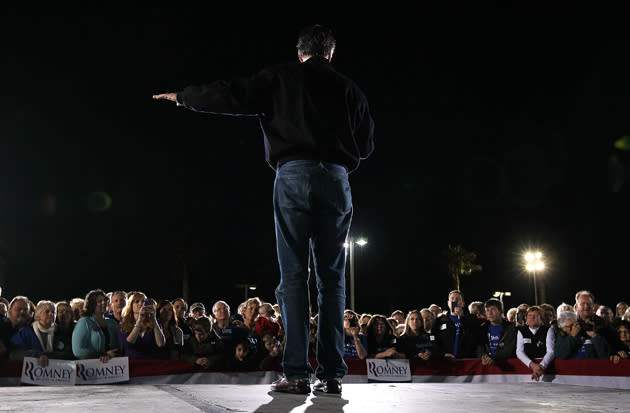 The Ticket
The TicketOn the trail, Mitt Romney is trying to show his sensitive side

DENVER—Mitt Romney has long campaigned as the economy's Mr. Fix-It, the man who would "restore America back to its greatness," as he frequently says. Emotion is something he has rarely talked about, much less exhibited on the campaign trail.
He is not a candidate who lingers with voters. His interactions along the rope line or at meet-and-greets are usually succinct. At stops throughout the early primary states, Romney spent a lot of time shaking hands, signing autographs and posing for photos—but not much time actually talking to people.
At a stop in Charleston, S.C., last month, a man approached Romney and told him he lost his job and was planning to vote for him in hopes that he could get the country back on track. "Thank you," Romney replied. He didn't press the man on details and instead kept shaking hands as he moved down the line.
But as he has struggled to hang on to the mantle of the frontrunner in the Republican presidential race, Romney has tweaked his stump speech in subtle ways to counter the perception that he's too robotic and stiff—or maybe even too rich to care about average people. He has begun diverting from his usual stump speech, which was heavy on his explanations of his love and faith in America, to talk about the people he has met during his second presidential run.
"I've had the opportunity over the last several months to go across the country and meet people in this great land of ours, and these have been challenging times," Romney said at a stop in Colorado Springs. "I was getting my hair cut in a place in New Hampshire, and the barber, in his seventies, had expected to retire but couldn't afford to."
In Elko, Nev., Romney spoke of how "heartsick" he was to have recently met a group of seniors "who thought they would retire but are working minimum wage jobs to keep food on the table."
In Reno, Romney spoke of a couple he met who "used to think about where they were going to send their kid to college," adding, "Now they are wondering if they can put food on the table until their next paycheck comes in."
In Las Vegas, he spoke of "college kids" who pressed him on whether there will be jobs when they graduate. And at a stop just outside Denver, Romney spoke of a married couple he met who learned they were pregnant with their second child on the day they lost their home to foreclosure.
Romney never names the people he talks about, but he uses them as a way to talk about what he believes is the failure of President Obama's time in the White House.
"These have been a tough three years," Romney says at virtually every stop. "This president has failed the American people."
There have been rare public moments where Romney has had intimate encounters with voters. At a stop in Sumter, S.C., last month, an ABC News reporter witnessed Romney reach into his wallet and hand an unemployed woman cash as he shook hands with voters after a rally.
Romney's aides and supporters say that, behind closed doors, he is far more at ease than his persona on the stump suggests. They say he is someone who has a big heart—and is nothing like the rich, aloof man that his rivals have tried to define him as.
At a stop in Centennial, Colo., a supporter introduced Romney by telling a story of how the candidate rescued the 14-year-old daughter of a coworker at Bain Capital—a story that was mentioned repeatedly in 2008 but has been rarely mentioned during this campaign, four years later.
And Romney briefly mentioned his time as a Mormon lay pastor during a campaign stop last week in Atlanta—a subject he has mentioned only fleetingly during this campaign. He used the moment to talk about his experience in dealing with people who were struggling.
"In my church, we don't have a professional ministry, and so people are asked to serve as the minister, or the pastor of their congregation from time to time, and I had that privilege for, I think, over 10 years," Romney said, the Washington Post reported. "And in that capacity, I had the chance to work with people who had lost their jobs, in some cases, or were facing other financial distress, losing their homes. And I found that those circumstances were not just about money or numbers. They were about lives, and they were about emotions."
Asked about Romney's anecdotes, an aide to the candidate downplayed the idea that they were evidence of a shift in strategy—insisting that Romney was merely trying to define America's struggles "in personal terms."
More popular Yahoo! News stories:
• Mitt Romney wins narrow victory over Ron Paul in Maine's Republican caucuses
• In CPAC keynote speech, Sarah Palin urges a long, competitive primary season
• CPAC puts candidates' differences on display
Want more of our best political stories? Visit The Ticket or connect with us on Facebook, follow us on Twitter, or add us on Tumblr. Handy with a camera? Join our Election 2012 Flickr group to submit your photos of the campaign in action.
